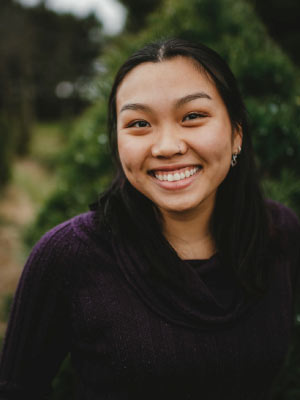
Melina Nguyen wants two things in life: a dog, and a vegetable garden. Being an undergraduate student interested in food systems and sustainability, gardening has been a constant in Nguyen’s life. In her childhood, she would spend time tending to a vegetable garden with her grandma, continued to manage a garden throughout high school, and now works at the People’s Farm. “Being able to connect with where our food comes from is an important step in caring for the environment, and it’s a big reason why I’m interested in food systems,” Nguyen says.
Nguyen also went camping and visited state and national parks while growing up, which furthered her interest in the environment. In high school, she took AP Environmental Studies. “It completely changed the way I thought about my relationship with the outdoors,” says Nguyen. She also took part in political canvassing and campaigning in high school, which piqued her interest in political science. Now an undergraduate at the University of Wisconsin–Madison, Nguyen is double-majoring in political science and people-environment geography, with certificates in public policy and environmental studies. She also is a student intern for the Office of Sustainability.

While she doesn’t have specific plans after graduation, Nguyen wants to prioritize her community engagement and have a fulfilling career. One career option she’s drawn to is working in environmental policy for a small-scale government. “I think it’s important to have a direct relationship with constituents and really be able to understand how my work on paper translates to the people and neighborhoods it’s affecting,” she says.
Within her field of study, Nguyen’s focus is on policy change related to sustainability and environmentalism. She’s also interested in how people can use policy to seek environmental justice, specifically how it applies to food security and food systems in different regions. Her background in geography helps her understand how different groups of people interact with their environment, and what this looks like on different spatial scales.
As an intern for the Office of Sustainability, Nguyen leads semesterly roundtable discussions* related to sustainability on campus. These roundtable events began last fall as a collaboration between Slow Food UW and the Associated Students of Madison’s Sustainability Committee to create a space for student leaders in sustainability to talk with each other, make connections, and share their work and resources. “It’s really great to hear about all of the incredible work that’s being done in sustainability, especially because this field can be full of so much climate anxiety,” Nguyen says. The roundtables provide a fun and inclusive space for students and sustainability organizations to network and make connections.
This month, Nguyen is leading a roundtable discussion on food sustainability — particularly food access and waste on campus, which is a topic that Nguyen and her fellow organizers are particularly passionate about. “We all consume food — it’s part of our day-to-day lives — but not a lot of people think about where their food is coming from and how it’s being produced.”
“With population growth and the way our food systems currently work, it’s simply not sustainable for people in countries like the U.S. to be consuming in the ways we are,” says Nguyen. One of the biggest contributors to unsustainable food is the amount of food we waste. A lot of resources — like fertilizers, energy, and water — go into food production, but Nguyen says that a large percentage of food in grocery stores ends up in landfills. Not only is the food being wasted, but so are the resources that went into its production.
“Reducing waste helps with the circularity of sustainability,” Nguyen says. “A lot of initiatives that combine food and sustainability focus on reducing food waste, whether that be reducing food scraps, repurposing food (such as composting), or increasing food security so people who don’t typically have access to food can use some of the food that ends up wasted.”

One way college students can prevent food waste is by taking advantage of — and destigmatizing — food security programs. Many college students don’t have consistent access to food, and this isn’t something they should be ashamed of. “Food insecurity is normalized in college,” Nguyen says. “It’s become so common for students to have an iced coffee for breakfast and ramen for dinner, but that’s not healthy for any of us.” By using food security resources on campus — like food pantries, recovery meals, and harvest handouts — college students can have more consistent access to food and help prevent food waste, achieving both food security and sustainability.
In addition to preventing food waste, college students can also be more sustainable by buying groceries and cooking for themselves instead of getting takeout. “I know that can be hard to do, sometimes I’ll pick up food on my way home because it’s exhausting to go grocery shopping after a long day of work and classes, but putting more time and thought into the things we eat can help us lead more sustainable lives,” says Nguyen. Being more thoughtful with food consumption is one of the best ways to take care of yourself and the environment.
Nguyen also wants college students to know that the sustainability organizations and programs on campus welcome anyone, regardless of their current relationship with food sustainability or environmentalism. “We value anyone who’s willing to show up, and I think it’s really great to hear from people who aren’t involved in environmental fields because they always offer a really unique perspective,” she says. “I strongly feel like sustainability is something that fits into everybody’s life, and I hope other people feel like it’s something they can be a part of in any way that they can.”
*Dates, times, and locations of the Office of Sustainability’s roundtable events can be found on their Instagram page, @SustainUW.
Meet Melina Nguyen during Earth Fest
Food Sustainability: Roundtable Dinner
Wednesday, April 24 | 5:30–7:30 p.m.
Learn more